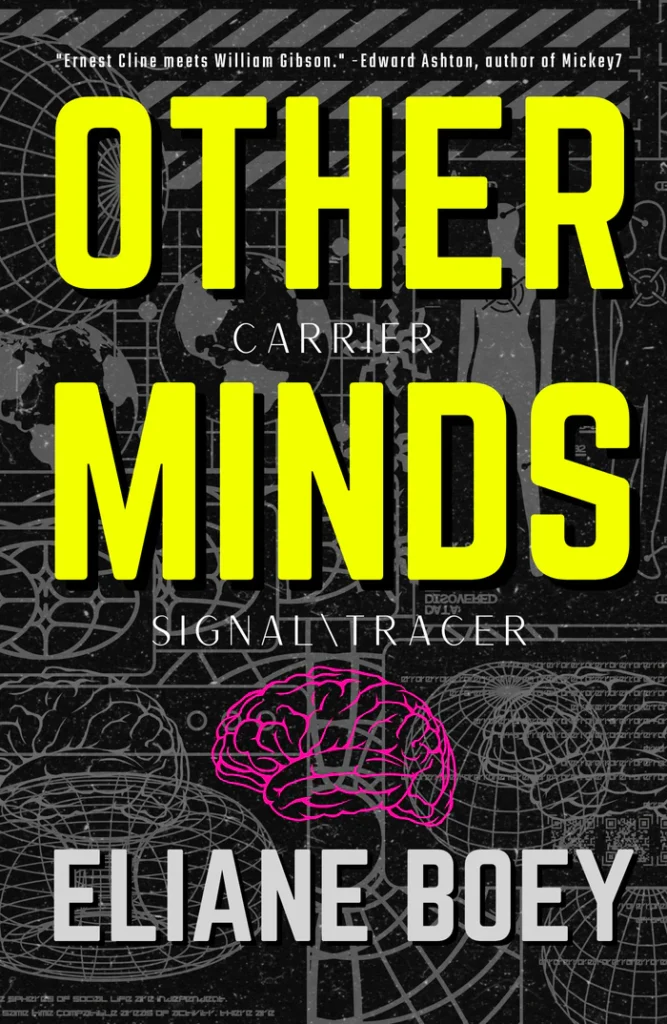Other Minds by Eliane Boey
Publisher: Dark Matter INK (September 5, 2023)
Language: English
Paperback
ISBN: 978-1-958598-19-1
A Horror Book Review by Ryan Tan
As dark and rich as a bowl of lor mee, Other Minds is a delightful debut that leaves me hungry for more.
Other Minds is a collection of two novellas by Eliane Boey. The first, Signal\Tracer, takes place in a future where most people live in a virtual simulation, eschewing the real world which has crumbled due to negligence. The protagonist, Xi, is an agent of the governing Administration, tasked with ensuring the success of the upcoming Renewal, an election-like process where people “renew” their loyalty to the Administration in exchange for real life benefits. The second novella, Carrier, takes place nearly fifty years after the first. While Signal\Tracer alternates between life within the simulation and life on the Outside, Carrier shifts between timelines. In the fictive present, the protagonist, Ming Wen, participates in a trial voyage of a spaceship she designed, called the RS Infinite Dream. In the fictive past, she is on trial for the rupture of another vessel she designed, called the SS Solar Endeavour. At first, the past and the present are described in different chapters, segregating the one from the other. Increasingly, however, images from Ming Wen’s past bleed into the present, blurring the line between imagination and reality.
I find it surprising that Carrier takes place after Signal\Tracer. The former centres around space travel, which seems less futuristic than technology that allows you to live in a virtual simulation. Nonetheless, both have escapism as their goal. The spaceships in Carrier physically remove their passengers from Earth, while the simulation in Signal\Tracer creates an entirely new world, putting mental distance between the user and real life. In terms of chronological order, either form of technology could come first. If space travel preceded simulations, one likely version of events is that humanity failed to find other planets to live on, forcing us to abuse simulations like drugs, in order to escape the mess we created. On the other hand, if simulations preceded space travel, one possibility is that simulations fell short of humanity’s needs, perhaps because we no longer felt that a purely mental escape was adequate. Consequently, space travel replaced simulations as the preferred mode of escape. Of course, a similar explanation could apply to the scenario where space travel precedes simulations. Either way, humanity’s definition of escape is not fixed, but fluctuating, suggesting that if there were a third novella set after the events of Carrier, it would feature a form of technology that provides mental, rather than physical, escape, akin to the simulation in Signal\Tracer.
I love how the characters in Signal\Tracer have single-word names while those in Carrier have two-word names. Compared to names like Ming Wen, Jia Jun, and Kun Chun, single-word names like Xi, Wei, and Roy seem abbreviated, as if names in Signal\Tracer are less useful as a marker of identity than those in Carrier. One reason for this is that users of the simulation have an avatar that they can customise as much as they like, allowing them to express their individuality without relying on names. In this sense, the return to “full”, unabbreviated names suggests the decline of simulations, recreating the need for names to distinguish one character from another. I also find it highly suggestive that the names of characters in Carrier are twice as long as those in Signal\Tracer, as if the Carrier characters are twice as human. And indeed, the protagonist of Signal\Tracer divides her time between the simulation and real life, splitting herself into two personas, each of which is half of her full, unseparated self. Ironically, creating an online persona halves, rather than doubles, who you are as a person. Perhaps this loss of identity foreshadows the failure of simulations in Carrier.
As dark and rich as a bowl of lor mee, Other Minds is a delightful debut that leaves me hungry for more.
WHAT WOULDN’T WE BUILD?
“Ernest Cline meets William Gibson.” -Edward Ashton, author of Mickey7
OTHER MINDS is a collection of two bold new novellas from Chinese Singaporean speculative fiction author, Eliane Boey.
CARRIER (22,000 words)
Ten years after her flagship project (the deep space hauler, Solar Endeavour) split in half while in orbit, aerospace designer Ming Wen is back, test-flying her new intelligent luxury orbiter, the Infinite Dream. The Dream is her chance at redemption, but also a chance at reconciliation with her estranged twenty-year-old daughter, Cora, who has joined the crew on the voyage. The launch is successful, but the mission might be doomed from the start. An uncanny presence has stowed away aboard the ship and now haunts Ming Wen. But on the Infinite Dream, there is no escape.
SIGNAL\TRACER (38,000 words)
A near-future cyberpunk story set in the digital world of Lion City, ruled by the Administration, for which two agents, Xi and Wei, must regulate an immersive mirror of their decaying Eastern city. That is, until Xi finds avatars controlled by dead users. The more she digs, the more questions are raised about her identity, the system, and her friendship with Wei.
Pre-Order a copy here


